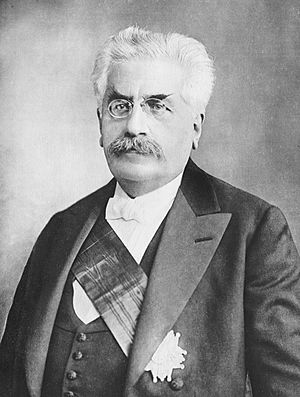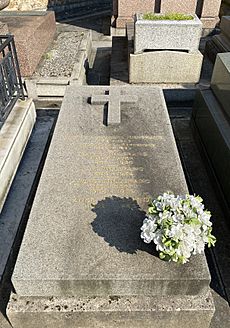Alexandre Millerand facts for kids
Quick facts for kids
Alexandre Millerand
|
|
|---|---|

Millerand in 1920
|
|
| President of France | |
| In office 23 September 1920 – 11 June 1924 |
|
| Prime Minister | Georges Leygues Aristide Briand Raymond Poincaré Frédéric François-Marsal |
| Preceded by | Paul Deschanel |
| Succeeded by | Gaston Doumergue |
| Prime Minister of France |
|
| In office 20 January 1920 – 23 September 1920 |
|
| President | Raymond Poincaré Paul Deschanel |
| Preceded by | Georges Clemenceau |
| Succeeded by | Georges Leygues |
| Minister of Foreign Affairs | |
| In office 20 January 1920 – 23 September 1920 |
|
| Prime Minister | Himself |
| Preceded by | Georges Clemenceau |
| Succeeded by | Georges Leygues |
| Minister of War | |
| In office 26 August 1914 – 29 October 1915 |
|
| Prime Minister | René Viviani |
| Preceded by | Adolphe Messimy |
| Succeeded by | Joseph Gallieni |
| In office 14 January 1912 – 12 January 1913 |
|
| Prime Minister | Raymond Poincaré |
| Preceded by | Adolphe Messimy |
| Succeeded by | Albert Lebrun |
| Minister of Public Works, Posts and Telegraphs | |
| In office 24 July 1909 – 3 November 1910 |
|
| Prime Minister | Aristide Briand |
| Preceded by | Louis Barthou |
| Succeeded by | Louis Puech |
| Minister of Commerce, Industry, Posts and Telegraphs | |
| In office 22 June 1899 – 7 June 1902 |
|
| Prime Minister | Pierre Waldeck-Rousseau |
| Preceded by | Paul Delombre |
| Succeeded by | Georges Trouillot |
| Personal details | |
| Born | 10 February 1859 Paris, France |
| Died | 6 April 1943 (aged 84) Versailles, Occupied France |
| Political party | French Socialist Party (1902–1904) Republican-Socialist Party (1911–1912) Independent (1912–1940) |
| Spouse |
Jeanne Millerand
(m. 1898; his d. 1943) |
| Children | Jean (1899–1972) Alice (1902–80) Jacques (1904–79) Marthe (1909–75) |
| Alma mater | University of Paris |
| Profession | Lawyer, journalist |
Alexandre Millerand (French: [alɛksɑ̃dʁ milʁɑ̃]; born February 10, 1859 – died April 6, 1943) was an important French politician. He served as the Prime Minister of France from January to September 1920. After that, he became the President of France, holding the office from September 1920 to June 1924.
Early in his career, Millerand joined a government that included a general who had been involved in putting down the 1871 Paris Commune uprising. This caused a big discussion among socialists about whether they should work with non-socialist governments.
Contents
Who Was Alexandre Millerand?
His Early Life
Alexandre Millerand grew up in Paris, France. His father was Jean-François Millerand. His mother, Amélie-Mélanie Cahen, came from a Jewish family in Alsace. His father's family was from Franche-Comté.
Millerand was baptized as a baby in 1860, and his mother became a Catholic. However, Millerand later chose to be an agnostic, meaning he wasn't sure if God existed. He even had a civil marriage ceremony, not a religious one. Later in life, he allowed his children to be baptized. He also worked to improve diplomatic ties between France and the Holy See (the Pope's government). His funeral was held in a Catholic church in Versailles.
Starting in Politics
Millerand studied law and became a lawyer. He became well-known for defending workers who went on strike in 1883. He also worked for a newspaper called La Justice, which was run by Georges Clemenceau. Millerand was also a Freemason for many years.
In 1885, he was elected to the Chamber of Deputies (a part of the French parliament) for the Seine area. He was part of the Radical Socialist group. He became known for his ideas on social laws. After some political problems affected many other politicians, Millerand's influence grew.
He led the Independent Socialist group, which had about sixty members. Until 1896, he was the editor of their newspaper, La Petite République. He believed that important industries should be owned by the public. He also supported workers' rights around the world.
Becoming a Government Minister
In June 1899, Millerand joined the government as the Minister of Commerce. At this point, he focused on practical changes instead of his earlier, more radical ideas. He worked to improve shipping, trade, technical education, and the postal system. He also tried to make working conditions better for people.
He created a special department to handle labor issues. He also made the pension and insurance office more important.
In 1902, he did not join other socialists in forming the French Socialist Party. Instead, he formed a smaller group called the Independent Socialist Party in 1907. This group later became the Republican-Socialist Party in 1911. Some people on the far-left felt that he had moved too far from traditional socialist ideas.
From 1909 to 1910, he served as the Minister of Public Works, Posts, and Telegraphs.
As Minister of Labor, he brought in many new reforms. These included:
- Reducing the maximum workday from 11 to 10 hours in 1904.
- Introducing an 8-hour workday for postal employees.
- Setting maximum hours and minimum wages for all work done for public authorities.
- Including workers' representatives in important labor councils.
- Setting up special courts and inspectors to handle labor issues.
- Creating a labor section within his Ministry of Commerce to deal with social insurance.
He also made sure that older laws protecting workers were strictly followed. He is especially remembered for his work on a project to create old-age pensions, which became law in 1905. In 1898, he also became the editor of La Lanterne newspaper.
Millerand served as Minister of War twice. The first time was from 1912 to 1913. The second time was during the early part of World War I, from 1914 to 1915.
As Prime Minister
Millerand continued to move towards more conservative political views. He was appointed Prime Minister by the conservative President, Paul Deschanel. During his time as Prime Minister, a new rule was introduced in February 1920. This rule gave seamen an eight-hour workday.
As President of France
Later in 1920, President Deschanel had to resign due to health issues. Millerand was chosen as a compromise candidate for President. He was supported by both conservative and some other political groups.
As President, Millerand tried to make the President's role more powerful. However, members of the parliament (the Chamber of Deputies and the French Senate) did not agree with this. Millerand was then forced to appoint a stronger Prime Minister, Aristide Briand. Briand's appointment was welcomed by many, but socialists did not join his government.
However, Millerand removed Briand after only a year. He then appointed the conservative politician Raymond Poincaré as Prime Minister.
People accused Millerand of favoring conservatives. This was unusual because French Presidents were traditionally neutral. On July 14, 1922, Millerand survived an attempt on his life by a young French anarchist. Two years later, Millerand resigned. This happened because of growing disagreements between the elected parliament and the President's office. Gaston Doumergue, who was the president of the Senate, was chosen to replace Millerand.
Alexandre Millerand passed away in 1943 in Versailles. He was buried in the Passy Cemetery. He also received the Serbian Order of Karađorđe's Star.
Millerand's Government (1920)
This section lists the main ministers who served in Alexandre Millerand's government from January 20, 1920, to September 24, 1920.
- Alexandre Millerand - Head of the Council and Minister of Foreign Affairs
- André Joseph Lefèvre - Minister of War
- Théodore Steeg - Minister of the Interior
- Frédéric François-Marsal - Minister of Finance
- Paul Jourdain - Minister of Labour
- Gustave L'Hopiteau - Minister of Justice
- Adolphe Landry - Minister of Marine
- André Honnorat - Minister of Public Instruction and Fine Arts
- André Maginot - Minister of War Pensions, Grants, and Allowances
- Joseph Ricard - Minister of Agriculture
- Albert Sarraut - Minister of Colonies
- Yves Le Trocquer - Minister of Public Works
- Auguste Isaac - Minister of Commerce and Industry
- Émile Ogier - Minister of Liberated Regions
Gallery
-
Alexandre Millerand as Minister of War, 1914.
See Also
 In Spanish: Alexandre Millerand para niños
In Spanish: Alexandre Millerand para niños
- Interwar France
- San Remo conference
 | William M. Jackson |
 | Juan E. Gilbert |
 | Neil deGrasse Tyson |






